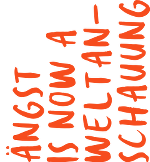Anja Golob | SLO Autorin, Publizistin, Übersetzerin, Dramaturgin | geboren 1976 in Slovenj Gradec, lebt in Ljubljana und Brüssel. Studierte Philosophie und Vergleichende Literaturwissenschaften an der Fakultät der Künste in Ljubljana. Veröffentlicht Lyrik auf Slowenisch und Deutsch, zuletzt: „Didaskalije k dihanju“, 2016 und „Taubentext, Vogeltext“, mit Nikolai Vogel, 2018. Erhielt 2014 und 2016 den Jenko Poetry Prize für den besten slowenischen Lyrik-Band. www.anjagolob.org
The Austrian novelist Sandra Gugic described current political developments in Central Europe in an article in the German newspaper "ZEIT" 2016 as follows:
The concept of the enemy generates the image of the enemy, the enemy is always the other one, and the other one is an ambiguous figure, a projection that that can be used at one´s convenience. Who is the other one? What / who is the foundation of society? Who is at the centre and who is on the edge? …Scare mongers use a language that evokes violence, a language that amplifies the fear of losing one´s identity, the fear of change.
(Sandra Gugic)
To what extent does this description apply to the political / social discourse in your country?
It applies perfectly, that is entirely. Let me demonstrate this by giving the following three examples:
- During the course of the refugee wave in 2015 the Slovenian government gave in to the reckless, ungrounded public fear and reacted with its own: it put up a 118 km long (according to some a 156 or even a 188 km long) wired fence with razors along the border with Croatia and called it a "technical obstacle".
Currently, Slovenia is a border country of the Schengen area, and the government repeatedly cited this as the basic reason for its decision - along with providing security for the citizens of the Republic of Slovenia (which has never been directly or indirectly endangered after the 10-day armed conflict with the ex-Yugoslavian army in June 1991).
Additionally, in the beginning of 2017, the parliament of the RS adopted an amendment to the Act on Foreigners (amendments to the Article 10.b) that governs action in altered conditions in the field of migration (ie. it strains conditions for foreigners to enter the country, enables potential returns of migrants etc.). This act can be used in practice - by the simple majority. In March 2017, Amnesty International published a list of abuses of said act.
-
In February 2016 the ministries of the RS in charge were looking for possibilities to accommodate 22 unaccompanied under-aged asylum seekers, and 6 of them (aged between 8 and 15) were supposed to be placed in abandoned parts of the residence hall in Kranj, on the initiative put forward by the principal of the residence hall. However, the accommodation never took place, as parents of students living there protested against it. The call to oppose the accommodation has also been signed by 24 professors of the secondary school Gimnazije Franceta Prešerna Kranj.
- The reaction by the general public (mostly on internet forums) to presenting Small Prešeren Awards to dramaturge S. Semenič and intermedia artist M. Smrekar – both women. Artists as “parasites”, leeches of “our” money, (modern) art perceived as useless, discardable due to ignorance.
The „language of fear“ - what influence does it have on one's own literary works?
It has no direct influence, but it does affect the subject of my work in as much as I explore the question of freedom as one of the main thematic cues.
What is the difference between the language of populism in political contexts and the use of exaggeration and stylization within a literary text?
The level of reality is different, hence the effect is different. This question is similar to asking if a person in a theatre-audience will jump on stage to help the dying Hamlet who has been wounded by a sword.
Can literature find a counter strategy regarding the language of populism - and if so, how?
I think we need to take at least one step back when asking this question: for literature to be able to do something like that, first of all, it would have to have a relevant position in the world, to be considered an equal partner for dialogue, to bear significance in a society that, on the other hand, put it in a relevant position. In Slovenia, literature is far from having such position, such significance.
Is literature an appropriate tool to speak out publicly as a writer? If yes why? If not - why not?
Absolutely yes. In my opinion it´s not possible at all to be a poet, a writer, a person working in the field of literature, and not be an active member of the civil society. It is an absolute obligation to speak out, to reflect on the status of public affairs at home and on a global level, to have an opinion and arguments to defend it, to debate, to stand up for people who have no voice and to give them voice, so that they can speak for themselves. This is one of the things that distinguishes this profession from others. I see writing literature as much more than putting words down on paper. It is a political act.
